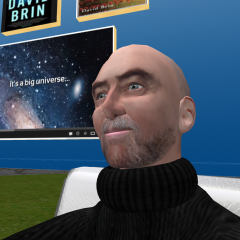Call for Papers: Organic Systems
Organic Systems: Environments, Bodies and Cultures in Science Fiction A one day conference organised by the London Science Fiction Research Community (LSFRC) 16 September 2017 Keynes Library, 43 Gordon Square, Birkbeck School of Arts, London WC1H 0PD Deadline for Proposals: 31st May 2017 Though often understood in ecological terms, the word ‘environment’ can also be viewed more widely as the surroundings and conditions of a specific system—whether they be mechanical, biological, social or chemical. Culture arises from and then informs these systems, becoming itself a further component of environments. Science fictional texts have explored the interactions between culture, environments and bodies on a wide spectrum of scale: from the level of a planetary biosphere or climate system (e.g. terraforming) to a single body or organ (e.g. genetic engineering). This conference will gather Science Fiction researchers, critics, authors and readers together to discuss intersections between cultural and organic systems in all forms of SF media. Potential topics for presentation include, but are not limited to: · Interactions between culture, ecosystems and organisms; · Rhetorics, stylistics and tropes common to ecological SF; · Ecological SF’s relationship to its context of production; · Living worlds (e.g. the Gaia hypothesis); · Analogical connections between smaller bodies (e.g. humans) and larger (e.g. cities, planets, universes); · Environmental utopian and dystopian themes; · The technological versus the natural in environmental systems; · The relationship between socio-political systems and the environment; · The impact of radically altered bodies and conceptions of the body on culture, and vice versa; · The aesthetic and conceptual significance of modes and subcategories such as Biopunk and Ribofunk; · Interrelations between posthuman theories and texts and different types of technological and environmental change; · Transhumanism, both as a movement and an ideology; · Connections between SF media and the geohumanities. The conference will also feature a keynote session with environmental humanities researcher Chris Pak, author and researcher Adam Roberts, award-winning SF author Paul McAuley and award-winning SF and fantasy author Gwyneth Jones. Conference organizers: Francis Gene-Rowe (PhD, Royal Holloway, University of London), Rhodri Davies (PhD, Birkbeck, University of London), Aren Roukema (PhD, Birkbeck, University of London). This conference is supported by the Centre for Contemporary Literature, Birkbeck, and the Department of English, Royal Holloway, University of London. Submit abstracts of up to 300 words for 20-minute papers by 31st May 2017 to: londonsfsymposium@gmail.com. Please include a brief biography of no more than 100 words. Applicants will receive a response by 1st July. For a PDF of the call for papers click here. Image: Hermetic Island by Tristram Lansdowne: watercolour on paper, 34 x 43 inches,...
Call For Papers: Dystopia Now
Friday 26th May 2017 9am-6pm Keynes Library, 43 Gordon Square Keynote Addresses: Professor Mark Bould (UWE), Dr Caroline Edwards (Birkbeck) The Centre for Contemporary Literature invites proposals for a one-day symposium on Dystopia Now. In an era of global turbulence, what pertinence do fictional dystopias have? Is dystopia a key genre for our time? Does it seem more vital than utopia? What key dystopian narratives are being produced now? What can we learn from rereading dystopias of the past in the light of the present? Please send proposals of c.200 words, for 20-minute papers, to Dr Joseph Brooker (j.brooker@bbk.ac.uk) by Monday 10th April. (For ease of reference please write 'Dystopia Now' in the subject line of your email.) Any further inquiries can be directed to the same email address. Relevant topics could include: * Science Fiction & Dystopia * Dystopia in other Fantastic Genres * Can Realism be Dystopian? * Where is Utopia now? * Gender and Dystopia * Visions of Climate Change and Eco-Apocalypse * Film and Visual Narratives * Rereading classic Dystopias in the present * How Dystopian is Now? Image by Lachlan Hardy, used under a CC BY 2.0...
David Brin at Birkbeck
Monday 10th April 2017 6:30-8:45pm Keynes Library, 43 Gordon Square Join the London Science Fiction Research Community as we host a talk by science fiction author, scientist, tech-consultant and futurist David Brin, who will be speaking to us on ‘Human Survival Amid Existential Risk’, as part of this year's research programme: 'Organic Systems: Bodies, Environments and Ecologies'. The talk will be followed by a Q&A and drinks reception. David Brin is the author of the award-winning Uplift series, as well as numerous stand-alone novels, graphic novels and short stories, and has received the Hugo, Locus, Campbell and Nebula Awards. His non-fiction writing includes The Transparent Society: Will Technology Force Us to Choose Between Privacy and Freedom? (1998), for which he was awarded the American Library Association's Freedom of Speech Award, and he has been invited to speak in the past by, among others, the White House, NASA, IBM, Google, and members of the US intelligence community. This is a rare opportunity to hear one of the world’s most influential futurists and authors of science fiction speak in the UK and we do hope you will join us for what promises to be a fascinating and stimulating evening. Places are limited and are likely to run out quickly, so do please book yours on Eventbrite to join. Click here for a poster for this event. Image by rosefirerising, used under a CC BY-NC-ND 2.0 licence....
Alluvium Special Issue on Contemporary Speculative Fiction
Our very own Alluvium Journal has just published Vol. 6, No. 1 – a special issue on "Contemporary Speculative Fiction," edited by Dr Mark P. Williams. The issue opens with Mark P. William's "Editorial Introduction" which considers the usefulness of speculative fiction as a generic and conceptual category for thinking about narrative's political and aesthetic work in imagining worlds that are rich in alterity. As Williams writes: "The term Speculative Fiction is, I believe, a usefully fuzzy term for designating a whole range of possible ways of making narrative. In part it seems imprecise because it moves away somewhat from the distinctions between Science Fiction and Fantasy that defined the establishment of the study of Science Fiction, and there are times when the clarity and precision of separation are extremely useful. But I think the relative imprecision. Or rather, the flexibility, of the term can also enable a higher level grasp of what we are dealing with: fictions which, above all, negate the present conditions of social expectation and the limitations of what can be expected to make sense. Speculative Fiction, in its breadth, says that we can make sense of the stories of wildly unlike events which do not seem to bear direct relation to our present times and concerns, and that those meanings can be powerful, significant and valuable to us." The issue then proceeds with Cathryn Merla-Watson's article “The Altermundos of Latin@futurism,” which gives a virtuoso survey of the richness of Latin@futurism. She details how the aesthetic and theoretical history of Latin@futurism draws together intersections with Science Fiction and the Gothic, while articulating its distinctness as a field and its sheer cultural breadth and diversity. Sébastien Doubinsky explores Jordan Krall’s use of 9/11 as a setting for Speculative Fiction in “Jordan Krall's Speculative Fiction.” In this article, Doubinsky links Krall’s engagement with post-9/11 America with various avant-garde and speculative pre-texts – from William Burroughs and J. G. Ballard to Zamyatin and Bulgakov – examining the ways this distinctly politicised aesthetic of representation functions. This is followed by Martyn Colebrook’s article “Martin MacInnes and Celtic SF,” which examines MacInnes’ Celtic speculative fiction. Colebrook situates MacInnes’ text in light of his precursors in both the Tartan Noir subgenre and more broadly in Scottish fiction and science fiction, particularly the work of Iain Banks, Irvine Welsh and Alasdair Gray to formulate a clear set of confluences with this distinctly Scottish tradition. Finally, the special issue concludes with Williams' own essay “Speculative Resistance in Lost Girls.” Here he considers Alan Moore and Melinda Gebbie’s Lost Girls in order to examine the intersections between that polemical text and Moore’s narrative poem celebrating gay love and...
The Limits of Estrangement
by Joseph Brooker This is a slightly revised version of the introduction to a panel discussion hosted by the Centre for Contemporary Literature, 2nd March 2017, in which I was joined by my colleagues Mark Blacklock, Caroline Edwards and Mpalive Msiska This brief document summarises some thoughts I’ve recently had about literature and the contemporary, and is presented as the opening of a critical conversation: an invitation for others to develop, substantiate and improve on these ideas. 1: Politics We are used to the idea of a contemporary era characterised by change and challenge, but in the world of society and politics the last year or two have presented more surprises than usual; even shocks. Just to stick to the most evident and pressing: the surprise of the vote for the UK to leave the European Union last June, and its ongoing effects; and the surprise victory of Donald Trump in the US election in November, and the ongoing effects of that event. (We can bracket, for now, Leicester City's dismissal of manager Claudio Ranieri, which Liverpool manager Jurgen Klopp considered an equally shocking and inexplicable event.) Both these events currently seem endless in their capacity to produce effects: in other words there hasn’t been a day that they haven’t dominated the news agenda in some new or continuing way. The night before this panel took place offered, in the UK, another controversial vote in the Upper House of Parliament, followed by Donald Trump’s first State of the Union address. The effects of the Brexit vote are large and controversial, and will not be addressed further here. It is the US situation that I think has more to do with the mood announced in our title. Put succinctly, my main prompt for this panel was the idea that the new political situation in the US has advanced us into a position where reality seems closer than it did before to science fiction, or to dystopia, or to surrealism, or some other kind of dark fantasy. In one way, when written down in black and white, that proposition looks excessive and itself unrealistic. Yet the idea has been pervasive for some 3 months now. Here are just three instances to illustrate that point. On election day itself, in November 2017, Sophie Gilbert wrote in The Atlantic that ‘many […] writers have been compelled to sketch out their visions of a Trump presidency, and while their scenarios have differed when it comes to specifics, all of them fit neatly into the category of dystopian fiction. From mass deportations to child soldiers fighting wars with Mexico to a nation whose only news source...






Recent Comments